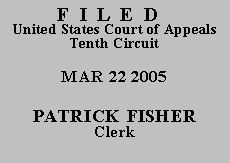

|
BOBBY D. RILEY, |
|
Before EBEL, MURPHY, and McCONNELL, Circuit Judges.
Riley filed the instant § 2254 petition on December 1, 2003. In the petition, Riley asserted a claim that his due process rights were violated by the imposition of consecutive sentences and a claim that the use of his juvenile adjudications to calculate his criminal history score violated the holding of Apprendi v. New Jersey, 530 U.S. 466 (2000). Respondent filed a motion requesting the district court to dismiss Riley's § 2254 petition as untimely. See 28 U.S.C. § 2244(d)(1)(A), (d)(2). Riley argued that he was entitled to equitable tolling of the one-year limitations period. The district court considered Riley's arguments but granted Respondent's motion, concluding that equitable tolling was not warranted because Riley had not demonstrated that his failure to file a timely petition was caused by extraordinary circumstances beyond his control. See Marsh v. Soares, 223 F.3d 1217, 1220 (10th Cir. 2000).
In his application for a COA and accompanying brief, Riley does not argue that his § 2254 petition was filed within the one-year limitations period. Instead, he re-asserts the argument that he is entitled to equitable tolling and challenges the basis on which the district court denied his request for equitable tolling. We review for abuse of discretion a district court's decision whether or not to equitably toll the one-year limitations period. Burger v. Scott, 317 F.3d 1133, 1141 (10th Cir. 2003).
Riley is not entitled to equitable tolling unless he can demonstrate that he
diligently pursued the claims raised in his § 2254 petition. See Marsh, 223
F.3d
at 1220. The record before this court establishes that Riley failed to act in a
diligent fashion to preserve his right to file a federal habeas petition. Riley
initiated state proceedings more than one year after he was sentenced and, by his
own admission, he then waited one hundred and fifty-eight days after the Kansas
Supreme Court denied his petition for review to file his § 2254 petition. Thus, it
is clear that the district court did not abuse its discretion when it refused to
equitably toll the one-year limitations period.
To be entitled to a COA, Riley must show "that jurists of reason would
find it debatable whether the district court was correct in its procedural ruling."
Slack v. McDaniel, 529 U.S. 474, 484-85 (2000) (holding that when a district
court dismisses a habeas petition on procedural grounds, a petitioner is entitled to
a COA only if he shows both that reasonable jurists would find it debatable
whether he had stated a valid constitutional claim and debatable whether the
district court's procedural ruling was correct). Our review of the record
demonstrates that the district court's dismissal of Riley's § 2254 petition as
untimely is not deserving of further proceedings or subject to a different
resolution on appeal. Accordingly, this court denies Riley's request for a COA
and dismisses this appeal.
Entered for the court
PATRICK FISHER, Clerk of Court
By
Deputy Clerk
1.Riley's motion was construed by the Kansas Court of Appeals as a habeas corpus motion under Kan. Stat. Ann. § 60-1507.